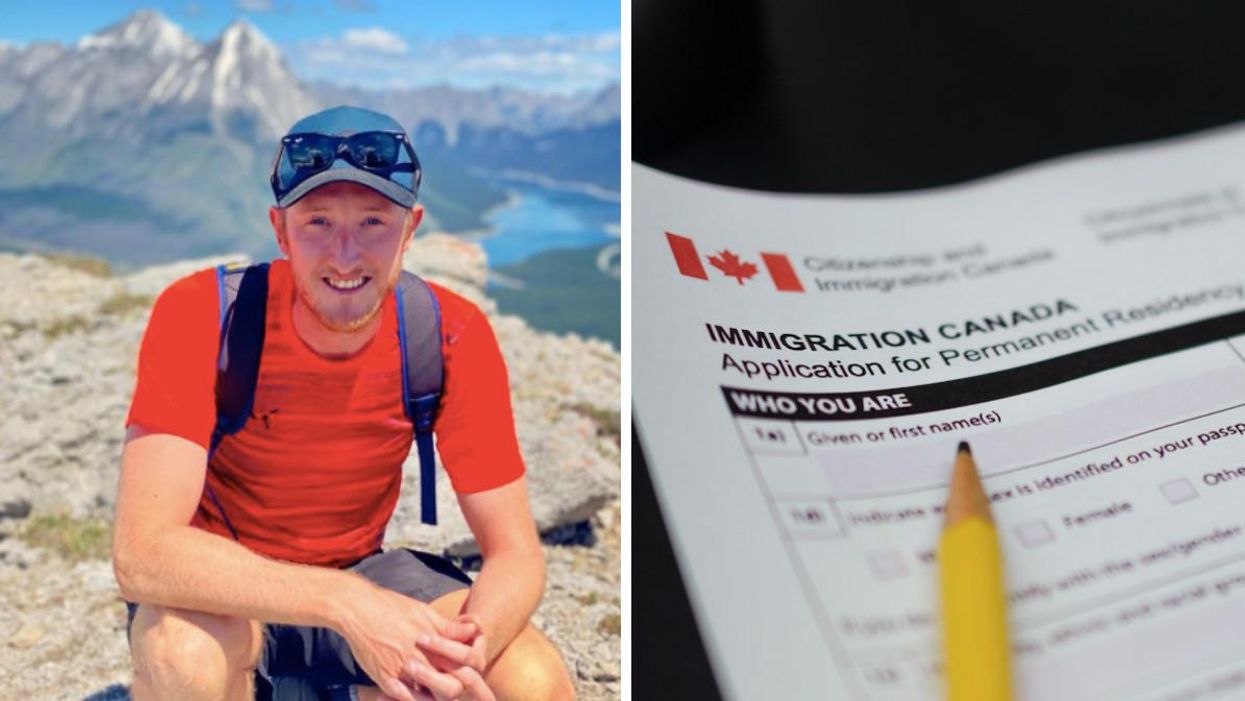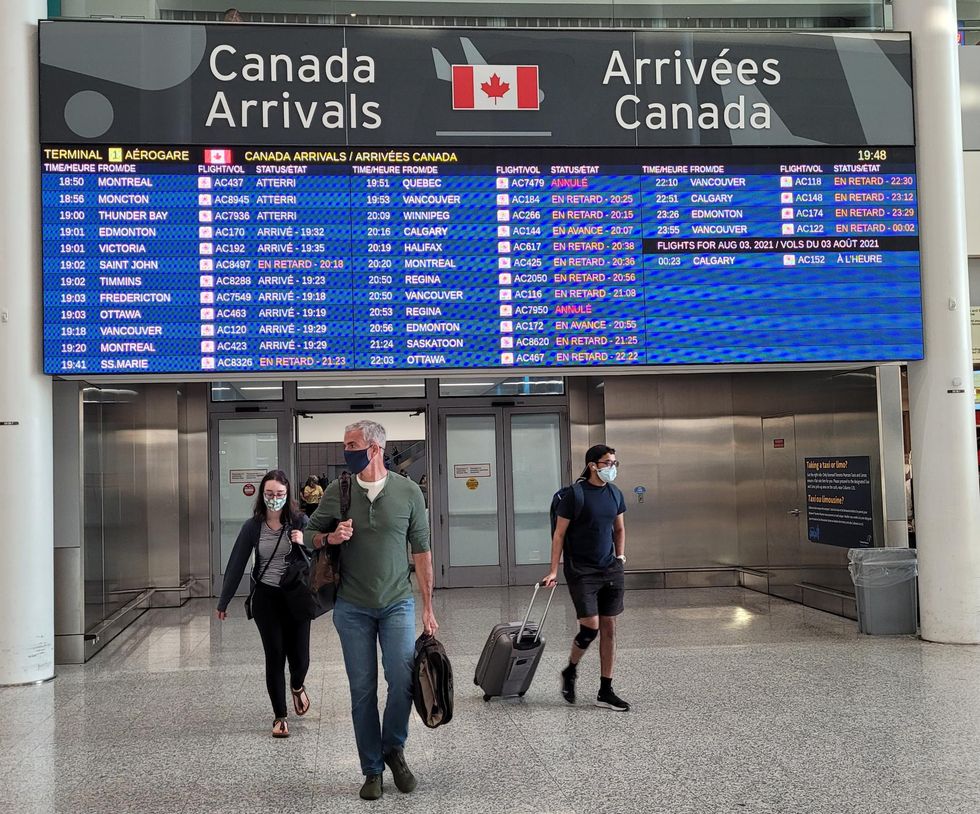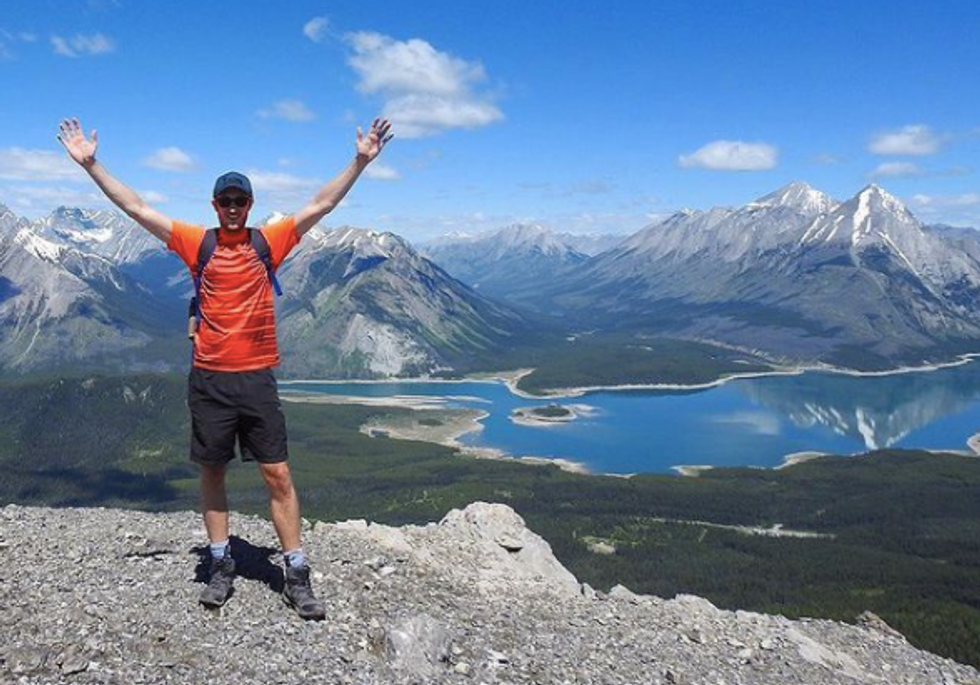7 Things I Didn't See Coming When I Applied To Be A Permanent Resident In Canada
I didn't realize how random the English test was going to be!

Daniel Milligan on top of a mountain in Alberta. Right: A permanent residency application and pencil.
This Essay article is part of a Narcity Media series. The views expressed are the author's own and do not necessarily reflect the views of Narcity Media.
Hundreds of thousands of people become permanent residents in Canada every year — but if you've been through the process, you'll know that it's anything but straightforward.
As a U.K. citizen in full-time work in Canada, I was able to apply as an Express Entry candidate (you'd think express means it'd be quick, right? Wrong).
Before my honest account of the process, and before you all tell me that I should just go back to the U.K. if I don't like it, I should add that I do actually love Canada, which is why I applied to be a permanent resident in the first place.
There Is Soooo Much Admin

This part could be 3,000 words long, so I'll try and summarize.
Assuming you are eligible to apply, it's time to create your online profile and start gathering your documents. You need a passport ID, proof of work, a certificate showing your police record, proof of funds, a medical exam, proof of education and an English or French language test (explained in #2).
Sounds easy, right? Again, wrong. Getting your proof of education can take weeks, as can the police certificate, plus the medical exam costs a small fortune (my rant about fees in #4). This stage can take months.
The English Test Is Actually Really Hard
One of the mandatory steps for creating a permanent residency application is a language test. It's in English or French and you get extra points (explained in #3) towards your profile if you are bilingual.
I'm a journalist with a decade of writing experience but I didn't realize how nervous I'd get for this test. There are four sections during the three-hour exam — listening, reading, writing and speaking — and some of the random questions totally caught me off-guard. One of the speaking questions was to describe a picture, which was a bunch of children's toys placed in a sandwich. Just bizarre!
You Become Obsessed With 'The Pool'
Did you get pulled out of the pool? Did you get picked out of the draw? That's all you say for the next few weeks after submitting your profile online.
The pool is essentially all the permanent resident applications at that current moment. Everyone has an individual score based on their profile — work experience and language test scores are among the factors to getting a high score. The higher your score, the better chance you have of getting an invitation to apply.
An invitation to apply? I thought I had applied. No, this is ANOTHER step. You get your invite and then you have 60 days to submit all your documents, including some of the same details from before AGAIN. Oh, and you need to pay the fees so I hope you've been saving.
It Costs A Hell Of A Lot

Permanent residency is not a cheap way of staying in Canada. The fees to apply are currently $1,325 but when you add a police certificate ($100), proof of education ($280), medical exam ($300) and the language test ($280) it comes to around $2,500.
And that's just by doing the application yourself. Immigration lawyers want between $1,500-$3,000 per application to assist you in the process.
That's a lot of Timbits!
It's Called Express Entry But It Takes Forever

monkeybusinessimages | Dreamstime
You'd think all the admin, tests and stress of the application would be finished now? Wrong. The wait for your permanent residency to be approved is arguably one of the most frustrating processes I've ever experienced.
You just watch your online profile apparently sit dormant for months as your current visa's expiry date ticks ever closer.
A tip if you're thinking of emailing, asking for an update on your application. Don't — the generic response four times in a row will just infuriate you even more.
You Get Approved But You Can't Go Abroad

The day has finally arrived. An email or letter finds its way to you and you've been approved — you've got your CoPR (or Confirmation of Permanent Residence). You're free to roam around this great planet, knowing that you've got ID to get you back into Canada, right? Again, wrong.
If you want to travel internationally, your CoPR is useless. You're not allowed to leave the country until you get your physical card, which for me took FIVE months.
If anyone from the immigration department reads this and can explain what seems to me to be a nonsensical process, I'd love to learn.
How Happy You Are When Your Card Arrives

So, after another five months of waiting for my permanent resident card, it finally arrived in my mailbox. It actually arrived two days before I was flying back to the U.K. so the timing became a stroke of luck. I honestly didn't realize what a wave of relief it would be!
To sign off, my advice is that if you love Canada and you want to spend many more years in this wonderful country, go for permanent residency. But go into the process knowing that it will probably be in your top five most stressful experiences.
The opinions expressed in this article are the author's own and do not necessarily reflect the views of Narcity Media.
- 7 Things The 7-Year-Old Me Had To Learn When I Moved To ... ›
- 11 Things I Wish Someone Had Told Me About Canada Before I ... ›
- 9 Things I Wish Someone Had Told Me Before I Moved Across ... ›
- 9 Things I Didn’t See Coming When I Moved From The UK Into My Condo In Toronto - Narcity ›
- Canada Welcomed More Immigrants In 2021 Than It Has Ever Before In A Single Year ›
- Canada's New Immigration Plan Wants To Welcome More Than 1.3 Million Newcomers By 2024 - Narcity ›
- Canada Is Bumping Its Fees For New Permanent Residents & Here's How The New Figures Look - Narcity ›
- 6 Things That I Saw In PEI That Made Me Realize Island Life Is Really Not For Me - Narcity ›
- Canada Is Working On A New Process To Help People Become Permanent Residents Sooner - Narcity ›
- The Canadian Citizenship Test Is Actually Hard & Canadians Might Struggle With These Questions - Narcity ›
- 4 Big Benefits Of Having Permanent Resident Status In Canada & How You Can Get It - Narcity ›